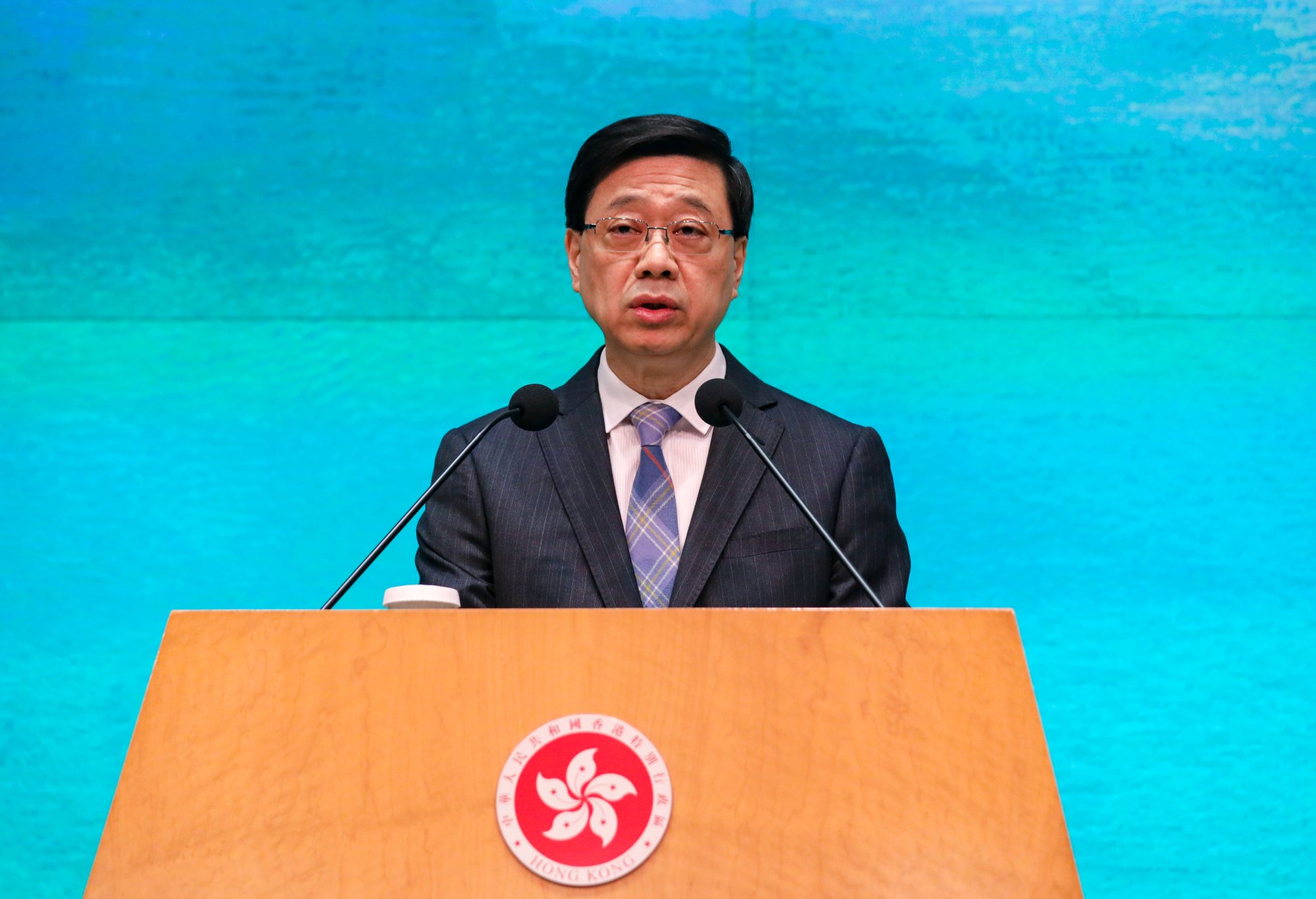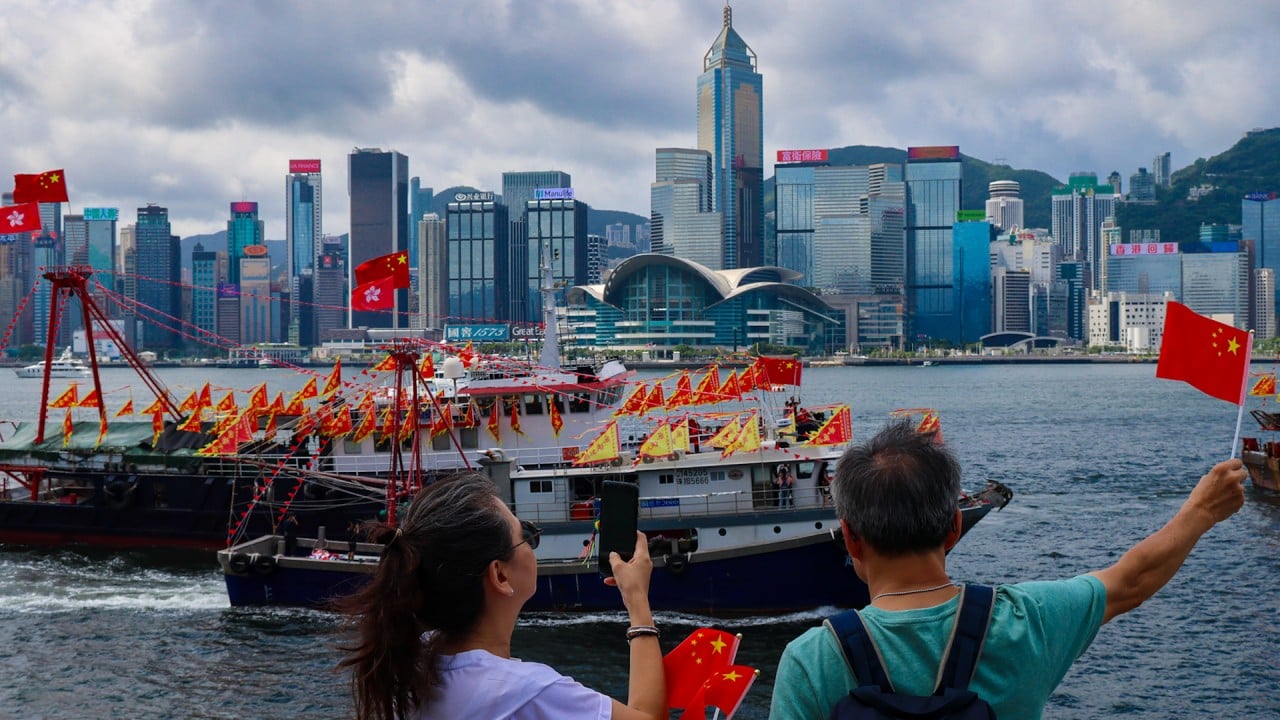
John Lee urges Hongkongers to take advantage of Beijing’s new measures, be innovative
- City leader also brushes aside calls for further increase of duty-free shopping allowance for mainland tourists visiting Hong Kong
Hongkongers should be innovative and capitalise on all beneficial measures presented by Beijing, the chief executive has said, while brushing aside calls to push for a further increase in the duty-free shopping limit for mainland Chinese tourists visiting the city.
“Our previous successes mean we can build and make success ourselves,” he said. “We cannot rest on our own laurels.”
To mark the 27th anniversary of the city’s return to Chinese sovereignty on Monday, Beijing announced it would gift Hong Kong a pair of giant pandas and introduce a five-year travel permit allowing permanent residents with foreign passports to enter the mainland.
Some said it was not as attractive as the 100,000 yuan annual limit for the country’s southern province of Hainan, also a popular destination for mainland tourists.

Asked whether he would fight for a higher limit, Lee said the increase was achieved “after a lot of efforts” by different central government ministries and authorities, adding it was important for the city to make good use of the new arrangement.
“It is important for us Hong Kong people, the government included of course, to capitalise on and make good use of all the different measures and ensure that they realise their best potential in Hong Kong,” he added.
Lee called on different sectors to ensure visitors had a good experience during their stay in Hong Kong.
“I urge everybody to think of innovative ways to capitalise on the new measures that have been offered to Hong Kong,” the chief executive said.
Lee also said the government had reached a consensus on further expansion of the Closer Economic Partnership Arrangement (Cepa) on the trade in services, noting it would cover areas in which Hong Kong had an advantage, such as law, finance and construction.
He said the series of measures provided by Beijing would create an amplification effect and benefit Hong Kong as a whole.
The government would continue to review any measures that would boost the city’s overall economic development and business environment and would stay in touch with Beijing over these areas, Lee said.
“If there is a need and we have found out that the policy is appropriate, we will definitely discuss it with the central government,” he said.
Lee’s call for the city to capitalise on Beijing’s measures echoed remarks by Zheng Yanxiong, director of the central government’s liaison office in Hong Kong, at a lunch with lawmakers on Friday.
Zheng urged the city to evolve from its role as a “superconnector” to a “super moneymaker”, the first time he had used such a term since taking office in 2023.
He urged Hong Kong to capitalise on the benefits provided by the “two systems”.
Lawmaker Michael Tien Puk-sun, who attended the lunch, told the Post that such a term implied that Beijing would like Hong Kong to be more proactive in addressing economic difficulties itself, rather than asking for more favours.
Lau Siu-kai, a consultant at the Chinese Association of Hong Kong and Macau Studies think tank, said Lee’s remarks did not reflect that the government was embarrassed or wanted to shy away from asking for too many measures that benefited Hong Kong.
“For measures that benefit Hong Kong, the central government will still grant them to Hong Kong no matter if the government requests them or not, as they realise that our economy is in a transition period, where we will have quite a few difficulties and challenges in the short to medium term,” he said.
Lau said he believed the city leader only wanted to remind local business operators to take full advantage of the opportunities already offered by Beijing first. He said society had only partly taken advantage of some measures, while ignoring or rejecting others, pointing to the nearby Qianhai economic zone as an example.
He said there was not much uptake in Qianhai, an emerging zone in Shenzhen with special policies for Hong Kong companies.
Lau said the central government would also have other considerations for not granting some measures to Hong Kong, and that it would have to take into account the thoughts of other provinces and potential effects on national interests.



